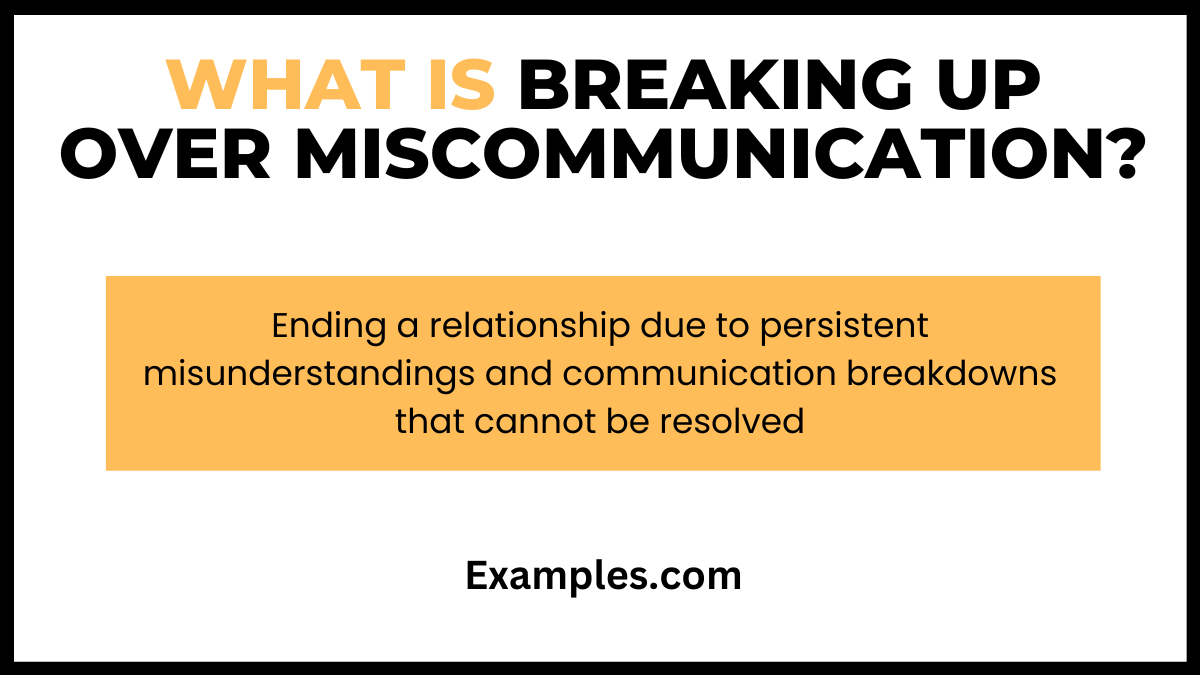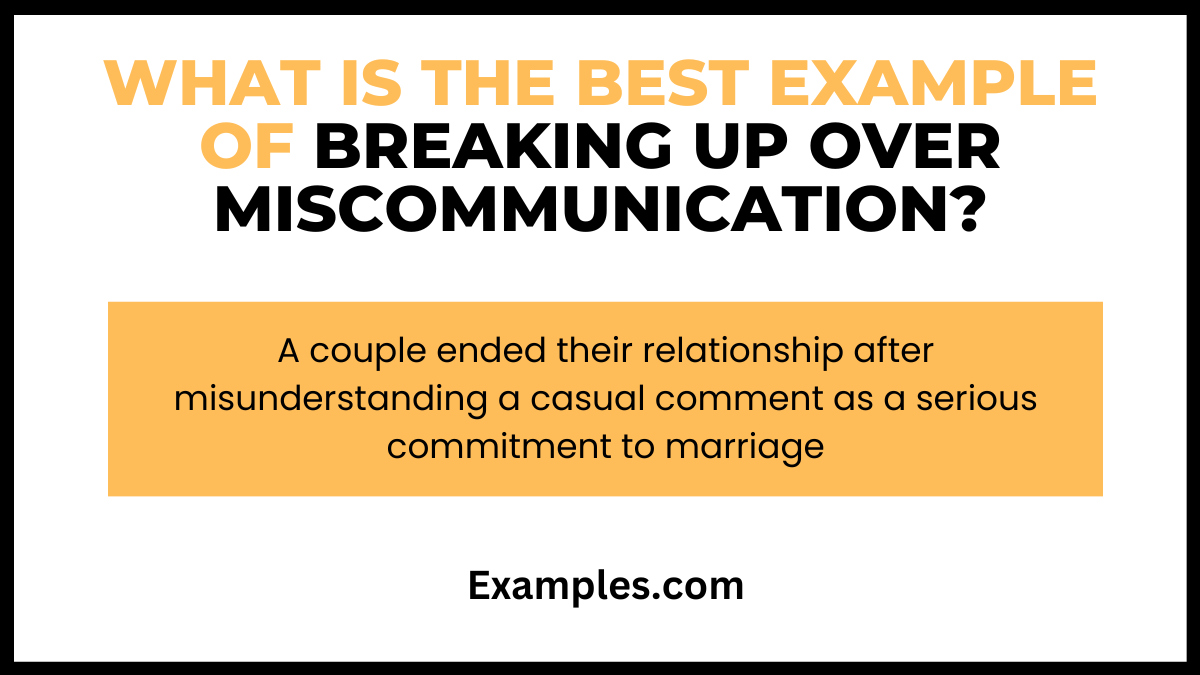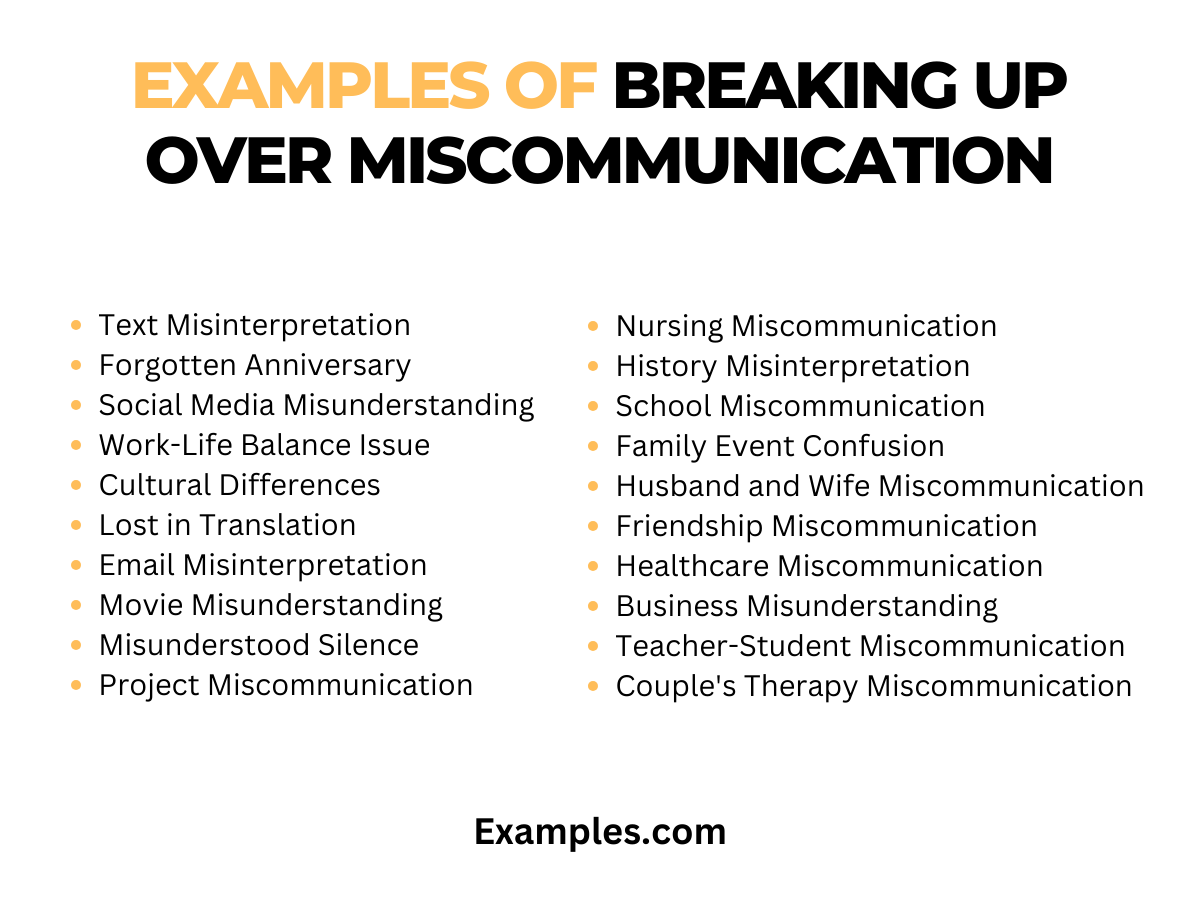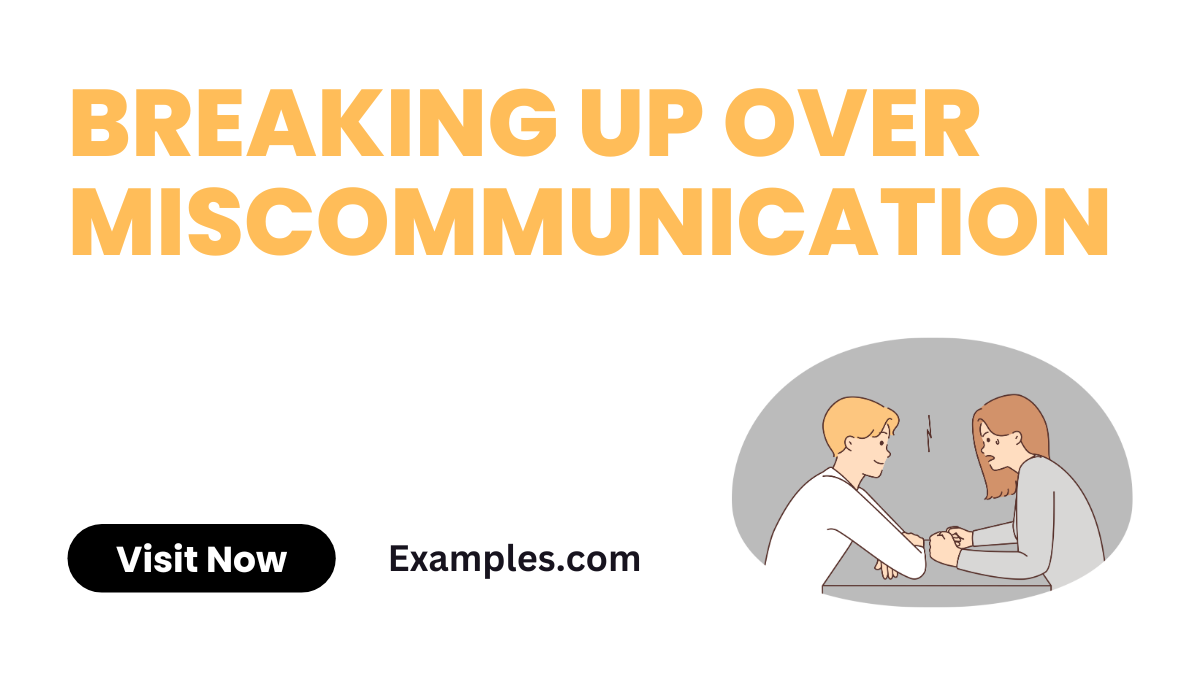19+ Breaking up Over Miscommunication Examples
Breaking up over miscommunication is a common yet complex issue many couples face. It stems from misunderstandings, assumptions, and ineffective communication channels. This guide aims to shed light on how miscommunication can lead to breakups and provides actionable advice on navigating these challenging waters. Understanding the dynamics of miscommunication and learning effective communication strategies can be pivotal in preventing unnecessary heartaches. This comprehensive guide offers insights, examples, and tips to better handle and resolve miscommunication in relationships.
What is Breaking up Over Miscommunication?

Breaking up over miscommunication refers to ending a relationship due to misunderstandings or failure to effectively communicate one’s thoughts and feelings. It often involves a lack of clarity, misinterpreted messages, and unmet expectations, leading to conflicts and eventual separation.
What is the Best Example of Breaking up Over Miscommunication?

A classic example involves text messaging. Misinterpretation of tone and intent in texts can create misunderstandings, leading to conflicts and, in some cases, breakups. This highlights the importance of clear and direct communication in relationships.
20 Examples of Breaking up Over Miscommunication

Miscommunication often leads to misunderstandings and, unfortunately, can result in breakups in various relationships. This can happen in personal relationships, the workplace, and even in healthcare settings. These examples highlight how miscommunication can have profound effects on relationships and emphasize the importance of clear and effective communication to avoid such outcomes.
- Text Misinterpretation: A couple broke up after one misinterpreted a sarcastic text message as serious, leading to an argument.
- Example: “I thought you were serious when you texted about breaking up. Why didn’t we talk it out first?”
- Forgotten Anniversary: Miscommunication about date plans led to a breakup due to perceived lack of interest.
- Example: “I thought we agreed to do something low-key for our anniversary. I didn’t realize it meant so much to you.”
- Social Media Misunderstanding: A misinterpreted social media post caused jealousy and a subsequent breakup.
- Example: “I saw your post with someone else and assumed the worst. We should have discussed it before I jumped to conclusions.”
- Work-Life Balance Issue: Constant miscommunication about work commitments led to a breakup over unmet expectations of time spent together.
- Example: “I thought we agreed to balance work and our relationship. Your constant overtime made me feel neglected.”
- Cultural Differences: Cultural miscommunication about relationship roles led to a breakup between partners from different backgrounds.
- Example: “I didn’t understand your cultural perspective on our relationship. We should have communicated our expectations better.”
- Lost in Translation: A language barrier caused a significant misunderstanding, resulting in a breakup.
- Example: “I misunderstood what you said in your language. I wish we had used a translator or clarified sooner.”
- Email Misinterpretation: An incorrectly interpreted tone in an email caused a rift leading to a breakup.
- Example: “Your email sounded so harsh. I wish we had talked over the phone instead.”
- Movie Misunderstanding: Miscommunication during a movie night led to a breakup over differing opinions.
- Example: “I thought we were just debating the movie plot. I didn’t realize you were upset with my views.”
- Misunderstood Silence: A partner’s silence was misinterpreted as disinterest, leading to a breakup.
- Example: “Your silence made me think you didn’t care. I wish we had communicated more openly.”
- Project Miscommunication: A couple working on a project together broke up over a misunderstanding of roles and responsibilities.
- Example: “I thought we had divided the project tasks clearly. Your lack of contribution felt like you didn’t care.”
- Nursing Miscommunication: A nurse’s miscommunication with a patient’s family led to distrust and strained relationships.
- Example: “I misunderstood the information from the nurse. Clearer communication could have avoided this upset.”
- History Misinterpretation: Misunderstanding a historical fact led to a heated argument and breakup.
- Example: “I wish we had researched together instead of arguing over historical details.”
- School Miscommunication: A miscommunication about academic goals led to a breakup between two students.
- Example: “I thought we were on the same page about our academic future. We should have talked more about our goals.”
- Family Event Confusion: Miscommunication about attending a family event led to a breakup due to differing family values.
- Example: “I misunderstood the importance of that family gathering to you. I wish we had discussed it beforehand.”
- Husband and Wife Miscommunication: A trivial misunderstanding escalated into a major argument, resulting in a breakup.
- Example: “I misinterpreted your comment and overreacted. We should have calmed down and talked it through.”
- Friendship Miscommunication: A miscommunication between friends about loyalty and support led to a falling out.
- Example: “I thought you’d back me up. We should have discussed our expectations as friends.”
- Healthcare Miscommunication: A doctor’s miscommunication about treatment options caused distrust and a breakdown in the doctor-patient relationship.
- Example: “I wish the doctor had explained the treatment options more clearly. Miscommunication led to unnecessary anxiety.”
- Business Misunderstanding: A miscommunication in a business partnership about investment strategies led to a split.
- Example: “Our miscommunication about the financial strategy was a big misunderstanding. We should have clarified our plans.”
- Teacher-Student Miscommunication: A misinterpreted comment from a teacher led to a student feeling unfairly treated, affecting their academic relationship.
- Example: “I misunderstood your feedback as criticism. A clearer explanation would have helped.”
- Couple’s Therapy Miscommunication: A misunderstanding during a therapy session led to a couple questioning their compatibility and eventually breaking up.
- Example: “In therapy, I thought you agreed to work on our issues. I misunderstood your commitment.”
Breaking Up Over Miscommunication in a Relationship
1. Lack of Clear Communication: Often, breakups occur when partners fail to communicate their feelings and needs clearly, leading to misunderstandings and frustration.
2. Assumptions and Jumping to Conclusions: Misinterpreting a partner’s words or actions without seeking clarification can create unnecessary conflicts.
3. Avoiding Difficult Conversations: Avoiding challenging topics or not addressing issues as they arise can accumulate unresolved issues, leading to a breakup.
4. Technological Interference: Reliance on digital communication can lead to misread texts and emails, losing the nuances of face-to-face interactions.
5. Emotional Misunderstandings: Misinterpreting emotional cues or not understanding a partner’s emotional state can create a disconnect, pushing couples apart.
Breaking Up Over Miscommunication Psychology
1. Projection of Insecurities: Individuals may project their insecurities or past traumas onto their partner, misinterpreting their actions.
2. Confirmation Bias: People often perceive and interpret information in a way that confirms their pre-existing beliefs, leading to miscommunication.
3. Stress and Mental Health: Personal stress or mental health issues can skew perception and communication, contributing to misunderstandings.
4. Attachment Styles: Different attachment styles can lead to varied expectations and communication patterns, causing conflicts.
5. Lack of Emotional Intelligence: Poor understanding and management of one’s own and others’ emotions can lead to miscommunication and eventual breakup.
Breaking Up Over Miscommunication for Employees
1. Unclear Instructions and Expectations: Misunderstandings about job roles and expectations can lead to dissatisfaction and departure.
2. Feedback and Performance Evaluations: Miscommunication during feedback sessions can result in feelings of undervaluation or unfair treatment.
3. Workplace Culture Misfit: Misalignment between an employee’s values and the workplace culture can lead to miscommunication and eventual exit.
4. Conflict with Colleagues or Management: Poor communication leading to unresolved conflicts can make the workplace environment untenable.
5. Career Goals and Growth: Miscommunication about career progression and development opportunities can lead to disillusionment and resignation.
Miscommunication can have profound consequences, even leading to the end of relationships. This article has provided a guide and tips on how to navigate and prevent such unfortunate outcomes. By fostering open and clear communication, actively listening, and seeking clarification when needed, individuals can preserve and strengthen their connections, avoiding unnecessary heartbreak and misunderstandings.



